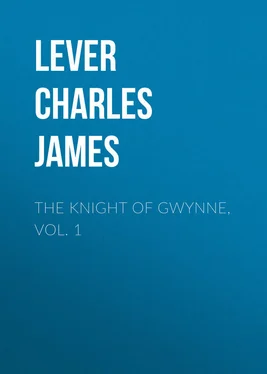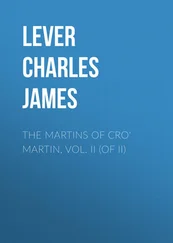Charles Lever - The Knight Of Gwynne, Vol. 1
Здесь есть возможность читать онлайн «Charles Lever - The Knight Of Gwynne, Vol. 1» — ознакомительный отрывок электронной книги совершенно бесплатно, а после прочтения отрывка купить полную версию. В некоторых случаях можно слушать аудио, скачать через торрент в формате fb2 и присутствует краткое содержание. Жанр: foreign_antique, foreign_prose, на английском языке. Описание произведения, (предисловие) а так же отзывы посетителей доступны на портале библиотеки ЛибКат.
- Название:The Knight Of Gwynne, Vol. 1
- Автор:
- Жанр:
- Год:неизвестен
- ISBN:нет данных
- Рейтинг книги:3 / 5. Голосов: 1
-
Избранное:Добавить в избранное
- Отзывы:
-
Ваша оценка:
- 60
- 1
- 2
- 3
- 4
- 5
The Knight Of Gwynne, Vol. 1: краткое содержание, описание и аннотация
Предлагаем к чтению аннотацию, описание, краткое содержание или предисловие (зависит от того, что написал сам автор книги «The Knight Of Gwynne, Vol. 1»). Если вы не нашли необходимую информацию о книге — напишите в комментариях, мы постараемся отыскать её.
The Knight Of Gwynne, Vol. 1 — читать онлайн ознакомительный отрывок
Ниже представлен текст книги, разбитый по страницам. Система сохранения места последней прочитанной страницы, позволяет с удобством читать онлайн бесплатно книгу «The Knight Of Gwynne, Vol. 1», без необходимости каждый раз заново искать на чём Вы остановились. Поставьте закладку, и сможете в любой момент перейти на страницу, на которой закончили чтение.
Интервал:
Закладка:
“‘Now, I must hazard my reputation a little, and ask what is the name of your second boy, and what is he doing?’”
Helen burst into a fit of laughter at these words, nor could Lady Eleanor’s chagrin prevent her joining in the emotion.
“This, he shall certainly have an answer to,” said the old lady, recovering her self-possession and her pride; “he shall hear that my second boy is called Helen.”
“After all, Mamma, is it not very kind of him to remember even so much?”
“I remember even more, Helen,” interrupted Lady Eleanor; “and no great kindness in the act either.”
“Shall I read all the possible and impossible chances of pushing my fortune in the Army or Navy, Mamma?” said Helen, archly, “for I see that his Lordship is most profuse in offers for my advancement, – nay, if I have a clerical vocation, here is a living actually waiting my acceptance.”
“Let us rather look for something that may explain the riddle, my dear,” said Lady Eleanor, taking the letter in her own hand, while she lightly skimmed over the last page. “No, I can find no clew to it here – Stay, what have we in this corner? – ‘Politically speaking, there is no news here; indeed, in that respect, your side of the Channel engrosses all the interest; the great question of the “Union” still occupies all attention. Virtually, we know the ministry have the majority, but there will be still a very respectable fight, to amuse the world withal. How does the Knight vote? With us, I hope and trust, for although I may tell you, in confidence, the result is certain, his support would be very grateful to the Government, and, while he himself can afford to smile at ministerial flatteries, Lionel is a young fellow whom rapid promotion would well become, and who would speedily distinguish himself, if the occasion were favorable. At all events, let the Knight not vote against the minister; this would be a crime never to be forgiven, and personally offensive to his Royal Highness; and I trust Darcy is too good a sportsman to prefer riding the last horse, even should he not wish to mount the winner.’”
Here the letter concluded, amid protestations of regard most affectionately worded, and warm wishes for a renewal of intimacy, only to cease with life. Across this was written, with a different ink, and in a hurried hand: “I have this moment seen Mr. Pitt; the Knight’s vote is very important. He may make any terms he pleases, – Pitt spoke of a peerage; but I suppose that would not be thought advisable. Let me hear your opinion. Lionel has been gazetted to a company this morning, en attendant better.”
Lady Eleanor, who had read these last lines to herself, here laid down the letter without speaking, while the slight flush of her cheek and the increased brilliancy of her eyes showed that her feelings were deeply and powerfully excited.
“Well, Mamma, have you found the solution to this mystery?” said Helen, as she gazed with affectionate solicitude on her mother’s features.
“How unchangeable a thing is nature!” muttered Lady Eleanor, unconsciously, aloud; “that boy was a crafty tuft-hunter at Eton.”
“Of whom are you speaking, Mamma?”
“Lord Netherby, my dear, who would seem to have cultivated his natural gift with great success; but,” added she, after a pause, and in a voice scarcely above a whisper, “I am scarcely as easy a dupe now as when he persuaded me to take ash-berries in exchange for cherries. Let us hear what Lionel says.”
“As usual, Mamma, four lines in each page, and the last a blank,” said Helen, laughing: – “‘My dear mother, what blandishments have you been throwing over the War Office? They have just given me my company, which, by the ordinary rules of the service, I had no pretension to hope for, these five years to come! Our colonel, too, a perfect Tartar, overwhelms me with civilities, and promises me a leave of absence on the first vacancy. Have you seen Forester, of ours? and how do you like him? A little cold or so at first, but you will not dislike that. His riding will please my father. Get him to sing, if you can; his taste and voice are both first-rate. Your worthy relative, Lord Netherby, bores me with invitations to his houses, town and country. I say “No;” but he won’t be denied. Was he not rude, or indifferent, or something or other, once upon a time, to the ancient house of Darcy? Give me the consigne , I pray you, for I hear he has the best cock-shooting in England; and let my virtue, if possible, be rewarded by a little indulgence. Tell Helen they are all giving up powder here, and wear their hair as she does; but not one of them half as good-looking.
Yours, as ever,
Lionel Darcy.
Hounslow, January 1st, 1800’”
“Is that Sullivan, there?” said Lady Eleanor, as her daughter finished the reading of this brief epistle. “What does he mean by staring so at the window? The old man seems to have lost his senses!”
“Ochone arie! ochone! ochone!” cried Tate, wringing his hands with the gestures of violent grief, as he moved up and down before the windows.
“What has happened, Tate?” said Helen, as she threw open the sash to address him.
“Ochone! he’s kilt – he’s murthered – cut down like a daisy in a May morning. And he, the iligant, fine young man!”
“Whom do you mean? Speak plainly, Sullivan,” said the commanding voice of Lady Eleanor. “What is it?”
“‘Tis the young officer from England, my lady, that came down the night before last to see the master. Oh, murther! murther! if his honor was here, the sorra bit of this grief we ‘d have to-day – ochone!”
“Well, go on,” said his mistress, sternly.
“And if he came down for joy, ‘t is sorrow he supped for it,’ the young crayture! They soon finished him.”
“Once for all, sir, speak out plainly, and say what has occurred.”
“It’s Mr. Bagenal Daly done it all, my lady, – divil a one of me cares who hears me say it. He’s a cruel man, ould as he is. He made him fight a duel, the darling young man, – the ‘moral’ of Master Lionel himself; and now he’s kilt – ochone! ochone!”
“Can this dreadful story be true, Helen?” said Lady Eleanor, as the faint color left her features. “Call Margaret; or, stay – Sullivan, is Mr. Daly here?”
“That he is, never fear him. He’s looking at his morning’s work – he’s in the room where they carried the corpse; and the fine corpse it is.”
“Go tell Mr. Daly that Lady Eleanor desires to see him at once.”
“Go, and lose no time, Tate,” said Helen, as, almost fainting with terror, she half pushed the old man on his errand.
The mother and daughter sat silently gazing on each other for several minutes, terror and dismay depicted in the face of each, nor were they conscious of the lapse of time, when the door opening presented Mr. Bagenal Daly before them. He was dressed in his usual suit of dark brown, and with all his accustomed neatness. His long cravat, which, edged with deep lace, hung negligently over his waistcoat, was spotless in color and accurate in every fold, while his massive features were devoid of the slightest signs of emotion or excitement.
For an instant Lady Eleanor was deceived by all these evidences of tranquillity, but a glance at old Tate’s face, as he stood near the door, assured her that from such signs she had nothing to hope. Twice had Mr. Bagenal Daly performed his courteous salutations, which, in the etiquette of a past time, he made separately to each lady, and still Lady Eleanor had not summoned courage to address him. At last he said, —
“Have I been mistaken, and must I apologize for a visit at an hour so unseemly? But I heard that your Ladyship wished to see me.”
Читать дальшеИнтервал:
Закладка:
Похожие книги на «The Knight Of Gwynne, Vol. 1»
Представляем Вашему вниманию похожие книги на «The Knight Of Gwynne, Vol. 1» списком для выбора. Мы отобрали схожую по названию и смыслу литературу в надежде предоставить читателям больше вариантов отыскать новые, интересные, ещё непрочитанные произведения.
Обсуждение, отзывы о книге «The Knight Of Gwynne, Vol. 1» и просто собственные мнения читателей. Оставьте ваши комментарии, напишите, что Вы думаете о произведении, его смысле или главных героях. Укажите что конкретно понравилось, а что нет, и почему Вы так считаете.












